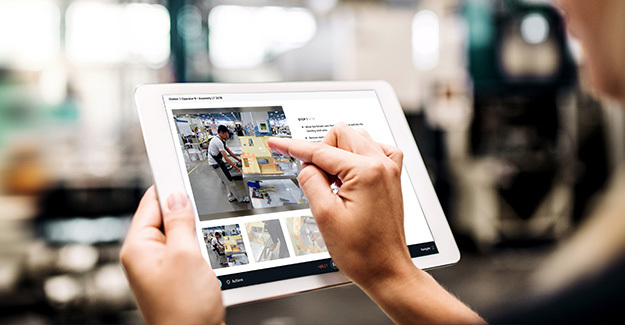
Training
7 min read
Using Digital Tools as a Recruitment Tool in Manufacturing

Manufacturers are being squeezed in both directions these days. Demand for products is outpacing their ability to secure raw materials for production, and they don’t have enough people power to satisfy the orders that are piling up. Factory floors are being forced to run skeleton crews and stagger shifts in order to have the right skills on staff to maintain production.
Even before the pandemic, a lack of skilled labor was the industry’s major challenge. A recent study released by Deloitte and NAM found that 77% of manufacturers say they will have ongoing difficulties attracting and retaining workers. When it comes to finding and recruiting in manufacturing, those that lead with digital tools can build a strong advantage.
Digital tools improve operational performance. They reduce turnover, boost employee satisfaction, and give people the information they need to work better.
Below, we’ll dive into how digital tools can help your company get more qualified candidates in the door so you can hit your production targets.
The Biggest Recruitment Challenge: Perception
Younger generations have outdated ideas about factory environments. They commonly think they are dirty and dangerous places to work, offering no room for advancement.
This should not come as a surprise. Manufacturing careers have been burdened with outdated public perceptions for a long time. The stains of early industrialization created a lasting image of the manufacturing workplace as a dangerous, dirty, dead-end career.
Those of us in the industry today know that this couldn’t be further from the truth. Modern facilities are typically clean, safe, and full of advanced technologies.
But that perception has yet to translate to career interest for young people. These modern advancements in manufacturing should also be leveraged as a potential recruitment tool.
Update Your Job Descriptions
In addition to the standard responsibilities and requirements sections, manufacturers should take this as an opportunity to brag about the various programs and tools that they have in place to support employee performance. Other industries already practice this.
Create job descriptions that list software and hardware employees will be interacting with on a regular basis. Show that your company isn’t stuck in the past and invests in employee performance.
What are you doing that’s unique or innovative? This is the time to talk about it. Or, if you are still getting started with digital technology, paint a picture of the ideal future state. Entice prospects with the exciting opportunity to be part of the transformation.
Use Excitement to Create Internal Advocates
The excitement that employees express when they have the opportunity to use modern technology in the workplace is palpable. Why not leverage this enthusiasm for employee advocacy programs?
Provide simple resources for employees to share on professional networks like LinkedIn. Create referral programs with rewards for successful new hires. Peer-to-peer validation is a powerful way to show recruits that your company supports its workforce with modern technology.
“When we put the tablets in their hands, we saw the positive reaction. We saw the smile on their face. And we can do the math and we can figure out the ROI. But what we took away from it was just this wave of enthusiasm and excitement about this technology. That was a powerful moment.”
Show Use of Digital Tools on Your Website
Without stepping onto the factory floor, your website is where a majority of people come to learn about your business. It acts as a first impression that influences their decision far before they read the job description.
Make your company stand out by adding visuals of tablets and modern tools being used by employees
Younger generations are “digital natives.” This means that they expect to work with digital tools. They are more comfortable learning from a tablet than from a paper binder. Chances are they view operations not using digital tools as organizations that provide a poor employee and career experience.
Digital Tools Are a Path for Career Progression
Win qualified candidates from competitors by showing them a career at your company – instead of just a job. Create a compelling employee value proposition that encourages workers to imagine a future with your organization.
 (The Caterpillar career page (CAT) demonstrates the use of modern technology and communicates a clear vision for the future, for example.)
(The Caterpillar career page (CAT) demonstrates the use of modern technology and communicates a clear vision for the future, for example.)
The future is digital. Knowing how to use modern manufacturing tools is a valuable skill set for frontline workers to have. Employees are excited to use digital tools because they improve the way they work, but it’s also an opportunity to gain modern skillsets.
The skills they gain will make them more marketable in an industry that continues to evolve. Demonstrating the use of modern digital tools shows new recruits that your company is investing in their long-term success.
It’s clear that the operational workforce is eager to be empowered by digital tools.
We’ve seen many customers list Dozuki as a skillset used to reduce training times, save on quality costs, and even reduce turnover.
Future success in manufacturing will rely on digital tools. Show your recruits that you’re not afraid of change and are ready to support them in new and innovative ways.
The Plant Manager of the Future

Uncover what it takes to win in the modern manufacturing facility with this helpful ebook.
Related Posts
View All Posts
Training
A New Model For Manufacturing Hiring
14 min read
Constraint, Currency & Clarity What invention had the most profound impact on manufacturing hiring? Not the steam engine. Not the assembly line. Not lean practices. Not...
Continue Reading
Frontline Digital Transformation
Top Challenges Impacting the Frontline Workforce
5 min read
Even with advancements in technology and automation, the frontline workforce remains essential to modern manufacturing operations. In fact, 72% of factory work is still...
Continue Reading
Frontline Digital Transformation
4 Ways Digital Tools Improve Quality
9 min read
Twenty years ago, digital tools were “a thing.” Now they flow through all things. To some degree, every manufacturer is now a digital company. And with the right modern...
Continue Reading



